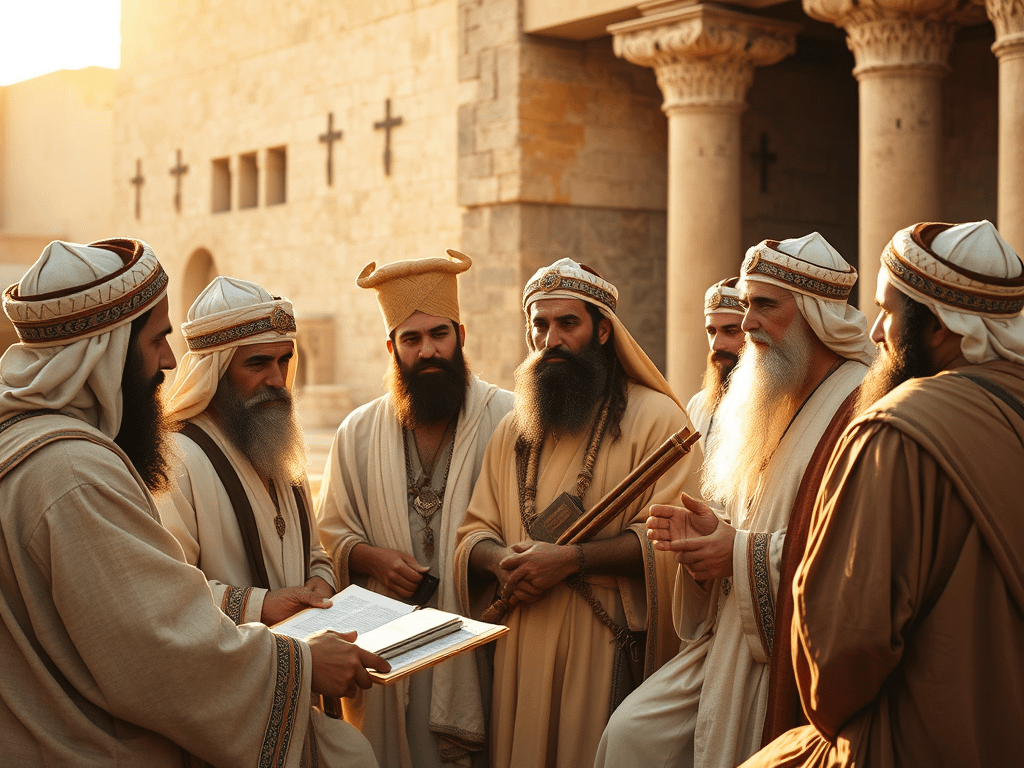Who was Lael in the Bible?
Who was Lael in the Bible? Have you ever wondered about the lesser-known figures in the Bible and their contributions to biblical narratives? Often overshadowed by notable characters like Moses or David, figures such as Lael hold intriguing, albeit brief, roles in the biblical texts.
Though mentioned sparingly, Lael represents a narrative thread that ties into the rich tapestry of biblical genealogy and tribal affiliations.
Understanding these characters provides us with deeper insights into ancient Israelite society and the structure of biblical clans.
This article delves into the significance of Lael within the biblical framework, exploring his lineage, his mention in the Scriptures, and the implications of his familial associations.
Lael’s Brief Mention in the Bible
Lael is primarily known from a single reference in the Bible, specifically in the Book of Numbers. In Numbers 3:24, Lael is identified as the father of Eliasaph, the leader of the Gershonites.
The Gershonites were one of the Levitical clans responsible for the care of the tabernacle. This mention, though brief, indicates the familial role and legacy that Lael contributed to within the Levite tribal structure.
| Aspect | Details | Relevance |
|---|---|---|
| Scriptural Reference | Numbers 3:24 | Identifies Lael’s son, Eliasaph |
| Tribal Affiliation | Gershonites | Part of the Levite lineage |
| Role | Father of Eliasaph | Connects to leadership in the tribe |
| Significance | Genealogical Importance | Ties to Levitical duties |
Although Lael’s name does not appear frequently, the mention within this genealogical framework suggests an important role in the lineage of the Levitical leaders.
This is indicative of the broader cultural and religious importance placed on family and tribal associations within ancient Israelite society.
The Importance of Genealogies in the Bible
Genealogies are more than mere lists of names in the Bible; they are crucial for understanding relationships, inheritance, and native ties.
Names like Lael’s serve to anchor the narrative history and spiritual undertakings of tribes such as the Levites.
The Levites, in particular, held the role of priests and caretakers of the tabernacle, a duty that required a highly dedicated and spiritually obedient lineage.
Therefore, even a minor mention as a father within these genealogies is a nod to sustaining a lineage of priesthood and dedication to God’s service.
“And the chief of the house of the father of the Gershonites shall be Eliasaph the son of Lael.” – Numbers 3:24
This citation highlights the specific mention of Lael and asserts the weight of Biblical genealogies in preserving the priestly and tribal heritage.
Understanding the Role of the Gershonites
The Gershonite clan, to which Lael’s descendants belonged, served under significant responsibilities.
They were one of the three main divisions of the tribe of Levi, and each division had particular duties.
For the Gershonites, their primary tasks included the care and transport of the tabernacle’s fabrics and coverings.
Understanding their role provides context for the significance of Lael’s mention. Their duties were critically important to the religious life of the Israelites as they wandered through the wilderness.
- They managed the curtain of the courtyard and the hangings surrounding the tabernacle.
- The Gershonites were tasked with maintaining the aesthetic and functional elements that supported the tabernacle.
- Their responsibilities ensured that the sacred spaces remained intact and prepared for worship.
These roles, passed down through generations, highlighted the importance of familial duty and the transference of sacred responsibilities.
Eliasaph, as a son of Lael, would have upheld these duties, indicating Lael’s indirect yet significant contribution to religious life.
The Levitical Lineage and Its Spiritual Implications
The Levitical lineage, of which Lael’s family was a part, carries profound spiritual implications. The Levites were set apart by God to serve specific roles in religious rites and duties revolving around the tabernacle, later the Temple.
This separation and sanctification underscore the idea of being chosen and dedicated to God’s service. As a part of this lineage, Lael’s mention situates him within a sacred historical trajectory marked by divine service.
Levitical service was not just a matter of family tradition; it was a divine mandate. Each family member’s alignment with these roles was seen as a fulfillment of God’s covenant with the Israelites.
This context allows us to appreciate Lael’s mention as more than genealogical. It is a reference to continuity in divine service and a reflection of the collective religious identity of his tribe.
The Cultural and Historical Context of Levite Service
To fully grasp the significance of Lael’s lineage, understanding the cultural and historical context of the Levitical service provides additional insight.
Initially, the tribe of Levi was not given a specific territory like the other tribes of Israel. Instead, they were granted cities within each tribe’s allotment to denote their dispersion amongst the Israelites for spiritual service.
This diaspora within the tribes signifies their universal role in teaching and maintaining the religious laws and customs amongst the people.
With such responsibilities, each Levite, including descendants of Lael, would be thoroughly integrated into the religious framework, fostering the spiritual well-being of Israel.

Biblical Narratives and Their Deep Ties to Family
Exploring biblical narratives, such as Lael’s, reminds us of the deeply rooted connection of family and faith within these stories.
Within the Bible, family lines are continuously highlighted, signifying the push towards a community not only bonded by blood but by a shared religious heritage.
This suggests that each individual, named or unnamed, significantly contributes to the story of faith through their familial lines.
Lael’s brief mention sets the stage for understanding how leadership and responsibility were historically viewed, asserting the importance of familial lines in bearing the weight of spiritual leadership and direction within their community.
Conclusion
Lael, despite his fleeting mention, embodies the significant intertwining of family heritage with religious responsibility within biblical narratives.
As the father of Eliasaph, a leader within the Gershonites, Lael’s legacy penetrates further into the fabric of Israelite religious life.
Through genealogies and tribal roles, such figures remind us of the profound historical and spiritual connections that shaped the lives and identities of those who served pivotal roles in ancient Israel.
While Lael’s name may not echo through the halls of biblical legend, his place within the scriptures weaves into the larger story of faith, community, and divine service.
FAQ
Who was Lael in the Bible?
Lael was the father of Eliasaph and is mentioned in the Book of Numbers as part of the Gershonite clan of Levites.
Where is Lael mentioned in the Bible?
Lael is mentioned in Numbers 3:24 as the father of Eliasaph, the chief of the Gershonite Levites.
What is the significance of Lael’s lineage?
Lael’s lineage is significant in establishing the Gershonite’s role in maintaining tabernacle responsibilities, highlighting the importance of Levite duties.
Why are genealogies important in biblical texts?
Genealogies establish lineage, inheritance, and tribal affiliation, crucial for understanding historical and religious contexts within the Bible.
What were the Gershonites’ responsibilities?
The Gershonites managed the fabrics and coverings of the tabernacle, playing an essential role in its maintenance and transport.
Why are Levites dispersed among tribes?
Levites were dispersed to serve religious roles across all Israelite tribes, facilitating spiritual guidance and observance of religious laws.







